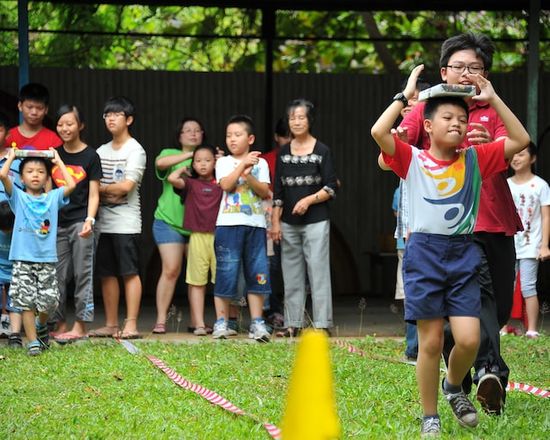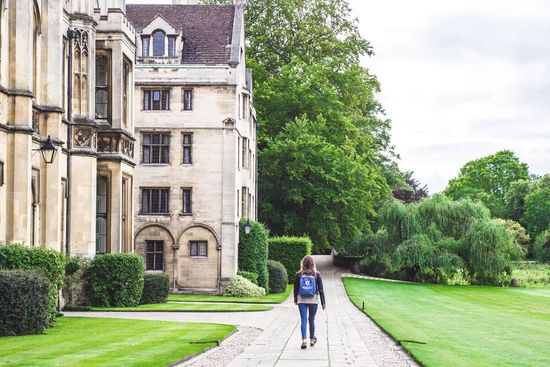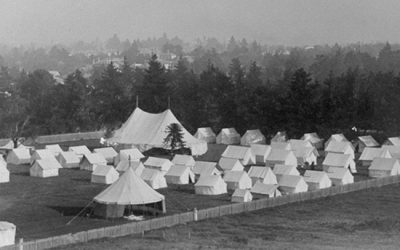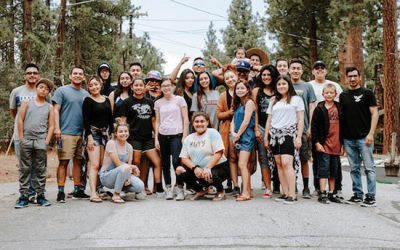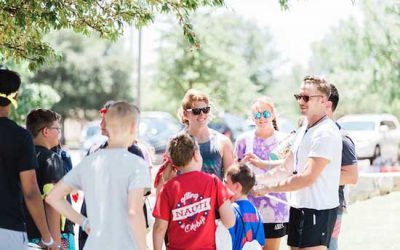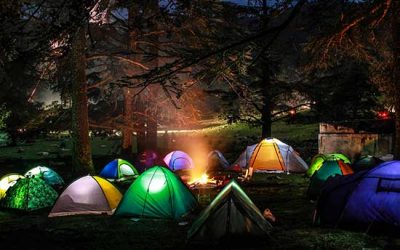Like the boy or girl scouts, Pathfinders and Adventurers learn about nature and life skills.
But what makes these clubs special is their purpose to bring young people closer to Jesus.
If you’ve wondered about Pathfinder or Adventurer clubs and what makes them different, here’s an easy introduction to these popular year-round programs.
You’ll learn all about:
- The history of Pathfinders
- What Pathfinders is like
- What Adventurers is like
- Pathfinder and Adventurer activities
- The benefits of becoming a member
- How to sign up your kids
So put on your sash and strap on those hiking boots! Let’s learn what it means to be a member.
The history of Pathfinders
Pathfinders began way back in the 1920s when Willa Steen and John McKim decided the Adventist Church needed a youth ministry program.1 They organized and held the very first Pathfinder club.
Elder Guy Mann was the first youth director to support the club.2 Although it broke off after a couple of years,3 a man by the name of John H. Hancock started it up again by 1946.4 And by 1950, the Pathfinder club was recognized by the General Conference.5 Later on in the 1980s, the Adventurer program was formed as a ministry for elementary-aged children.6
The result?
The church was able to pave the way for young people to get involved in ministry and community service early on in life.
Operating on a worldwide scale, Adventurers and Pathfinders continues to guide children, tweens, and teenagers today!
What Pathfinders is like
The Pathfinder club is for children ages 10–15 (or fifth – tenth graders).7 The members meet about once a week at the local Adventist Church. The meetings last from September to May. Although Pathfinders normally don’t meet over the summer, they might decide to induct new members in the summer months with a special induction ceremony.
They might begin the meeting by reciting the club pledge, marching, and singing the club anthem. From there they may start a group activity to win their patches – which are small embroidered badges they win for each course they complete.
The members are divided into different class levels depending on their age. They often split into their age groups once they start the group activity. Each class level has their own program with tasks they must complete before going to the next level.
The different class levels include8 :
- Friend: Fifth Grade
- Companion: Sixth Grade
- Explorer: Seventh Grade
- Ranger: Eighth Grade
- Voyager: Ninth Grade
- Guide: Tenth Grade
Because Pathfinders is for older children, the courses are more challenging and specific.
In order to earn the patch, members have to follow the instructions of Pathfinder activity books.
For example, the Guide activity book explains how to earn the community outreach badge.
The member can choose between visiting someone who’s stuck in their house, helping someone in need, or another leader-approved outreach activity.9 From there, they must describe their experience in a paragraph, and discuss how to witness to teenagers.10 Then they must try to witness using the techniques they discussed.
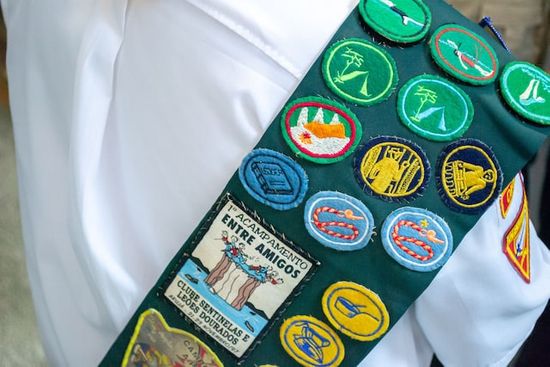
Photo by Jonas Kakaroto on Unsplash
With each course they complete, they receive a patch to add to their sash. They are given all of the patches they earned at the end of the year at an investiture ceremony where members get to display their marching skills and knowledge of the Pathfinder law and pledge.
And the achievements don’t stop there!
Members could win the Pathfinder Excellence Award at the end of every year, This is given to the member that goes above and beyond in his/her responsibilities as a Pathfinder.
But beyond earning awards and patches, Pathfinders is all about teaching its members to follow Jesus. These guidelines are in their law and pledge.
The Pathfinder Pledge: By the grace of God, I will be pure and kind and true. I will keep the Pathfinder law. I will be a servant of God and a friend to man.11
The Pathfinder Law12:
- Keep the morning watch.
- Do my honest part.
- Care for my body.
- Keep a level eye.
- Be courteous and obedient.
- Walk softly in the sanctuary.
- Keep a song in my heart.
- Go on God’s errands.
These principles help members enjoy a club that is friendly, fun, and Christ-centered.
What Adventurers is like
The Adventurer club is designed for younger children ages four-nine (or Pre–K kids – fourth graders). The members meet about once a week at the local Adventist Church. They also meet from September to May, with a break in Summer. They might begin the meeting by reciting the club pledge, marching, and singing the club anthem. After that, they’ll be split into their different age groups to complete their group activities and earn their patches.
Like Pathfinders, they have activities and classes based on each class level.
Also like the Pathfinders, they have specific, class-level activity books explaining how to earn their patches. For example, the builder activity book explains how to earn the reading patch. The member must read or listen to several books including some chapters of the book of Acts, a Bible story book, a safety book, a book about family or friends, a history book, and a nature book.13 After reading selections of these books and rating what they thought of it, they will earn the patch.14
Members earn patches with every course they complete, and receive them at the end-of-year investiture ceremony similar to the Pathfinder ceremony.
The different levels include15:
- Little Lamb: Pre-K
- Early Bird: Kindergarten
- Busy Bee: First Grade
- Sunbeam: Second Grade
- Builder: Third Grade
- Helping Hand: Fourth Grade
The Adventurers even have their own pledge and law.
The Adventurer Pledge: Because Jesus loves me, I can always do my best.16
The Adventurer Law17:
- Be obedient.
- Be pure.
- Be true.
- Be kind.
- Be respectful.
- Be attentive.
- Be helpful.
- Be cheerful.
- Be thoughtful.
- Be reverent.
These principles guide the Adventurers to love others, do their best, and work together for Jesus.
Pathfinder and Adventurer activities
These activities teach practical skills that will help young people later on in life. On top of that, they are fun and engaging, enabling children to try new hobbies and work together with others.
The courses themselves include the following subjects:
- Bible (spiritual lessons, general Bible knowledge, denominational history)
- Culture (art and history)
- Home economics
- Crafts
- Nature (botany, biology, and wildlife)
- Survival skills
- Recreation (sports and camping)
- Vocational development ( like accounting, teaching, car manufacturing)
Pathfinder activities are more advanced and specific. Examples of Pathfinder courses include Christian citizenship, origami, archery, and journalism (click Pathfinder Honors for the full list).
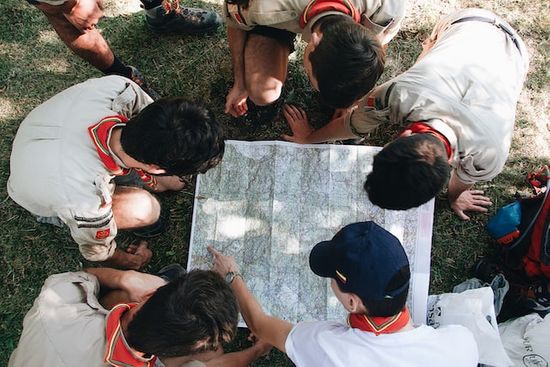
Photo by Mael BALLAND on Unsplash
Adventurer courses are less challenging and more broad. Some examples include bead crafts, sign language, being a good friend, and swimming (click Adventurer Activities for the full list).
Beside these activities, members can also go on field trips. These field trips are usually camporees – or camping trips – where members get to enjoy the great outdoors, learn about God, and meet other Pathfinders from other churches. There are both regional and union camporees, but the biggest event occurs every 5 years, where Pathfinders around the world have the chance to attend The International Pathfinder Camporee.18
Each year the camporee has a theme based on a Bible story. They also feature guest speakers and opportunities to earn special patches.19 Pathfinders get to meet members from around the world, try food from international vendors, and watch skits that portray the year’s theme.20
While at the site, they can participate in outreach and outdoor activities.21
This camporee is especially beneficial as many members take the camporee as an opportunity to get baptized.22
The benefits of becoming a member
So why exactly do we enroll our kids in after school clubs?
Because they’re enriching.
They give a little something extra to that child’s life whether that be learning a new skill, making new friends, or learning to be a team player.
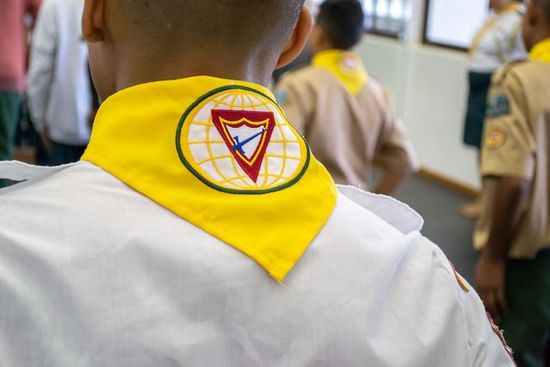
Photo by Jonas Kakaroto on Unsplash
But most of all, they’re fun!
Pathfinders and Adventurers are no different!
These programs are so valuable because they…
- Teach them practical life and survival skills
- Teach them about nature and the world around them
- Help them meet and befriend others who believe in Jesus
- Encourage them to build a Christlike character
- Strengthen their faith in Jesus
- Show the values of friendship, leadership, and community service
- Teach wholesome values
- Provide fun and educational activities
- Prepare children for future careers
Wanna hear the best part?
Besides giving children practical, hands-on experience, these programs will prepare them for a lifetime of serving Christ (Proverbs 22:6).
How you can sign up
Thinking about enrolling your child in either of these programs?
To sign up, all you have to do is contact the club leaders at your local Seventh-day Adventist Church. You can find out who leads the club by visiting the church website.
When you sign up, you’ll be asked to pay a fee. The Pathfinder leaders decide this amount, although it can vary from club to club. Some clubs include more enrollment costs in their fee—from covering the cost of patches to equipment and field trip dues.
The Pathfinder club is managed like typical clubs. Different positions from the club director to the secretary and treasurer all handle different areas and keep the club running. The club director is selected by the church, while the other positions are determined by the club as a whole.23
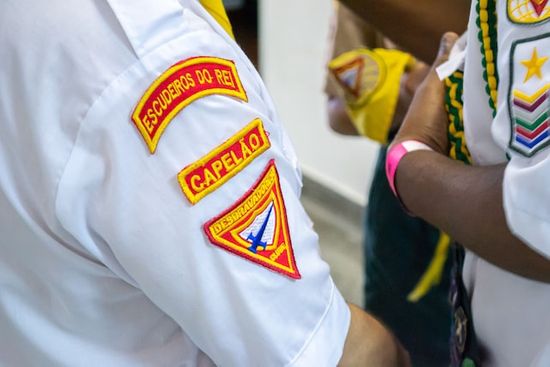
Photo by Jonas Kakaroto on Unsplash
Although, the roles that have the most interaction with the Pathfinders are the counselors and instructors. Much like a camp counselor, counselors are positions for older teenagers to guide the younger ones through activities.24 Instructors, on the other hand, are in charge of setting up and demonstrating the activities.25
There are a couple expectations for club staff from training.
Some of these expectations include26:
- Reflecting a Christian character (to provide a good role model for children)
- Prior experience with Pathfinders and the Adventist Church (the experience level varies based on the position, most require being an Adventist Church member)
- Attending the annual Pathfinder Leader Convention
- Receiving basic staff training (learning curriculum, club practices, and leadership skills27)
- Background checks and child safety training (to promote safety and prevent dangerous or abusive situations28)
These expectations ensure the children will only be led by the most qualified and responsible people.
Parents can participate in their child’s club by volunteering to help set up activities or prepare treats for the children. Parents can also do their part to repeat club lessons at home. Reminding children of spiritual lessons is especially important as parents.
Afterall, they have such a big role in helping their child get to know Jesus.
The only other thing you should know is that any child of any religion—as long as they fit the club age range—is welcome to enroll.
This means Pathfinders and Adventurers is open to everyone! Not just Adventists.
We firmly believe that Jesus values the spiritual growth and leadership of young people (3 John 1:4). This is why it’s so important that we make serious efforts to minister to the young people in our lives, to help them reach their full potential in learning new skills, serving their community, and growing stronger in Jesus.
Make a difference in the life of a child you know today!
Find a Church
If you’re interested in finding a local Adventist church near you, you can use the Adventist Locator provided by the General Conference of Seventh-day Adventists.
- “Pathfinders History,” clubministries.org, North American Division of Seventh-day Adventists, Accessed June 29, 2022, https://www.clubministries.org/pathfinders/pathfinders-history/. [↵]
- Ibid. [↵]
- Ibid. [↵]
- Ibid. [↵]
- Ibid. [↵]
- “Adventurer Club History,”clubministries.org, North American Division of Seventh-day Adventists, Accessed June 30, 2022, https://www.clubministries.org/adventurers/adventurers-history/. [↵]
- “Adventurers and Pathfinders,” gvsda.com, Golden Valley Clinton Seventh-day Adventist Church, Accessed June 29, 2022, https://paconference.org/pathfinders-adventurers/. [↵]
- Ibid. [↵]
- Pathfinder Guide Class Activity Book, (Central Jamacia Conference of Seventh-day Adventists, 2016), https://www.scribd.com/document/589999005/Guide-Activity-Book, pp. 13-14. [↵]
- Ibid. [↵]
- “Aim, Motto, Pledge, and Law,” gcyouthministries.org, Adventist Youth Ministries, Accessed June 29, 2022, https://www.gcyouthministries.org/ministries/pathfinders/aim-motto-pledge-and-law/. [↵]
- Ibid. [↵]
- Builder Activity Book, (North American Division Corporation of Seventh-day Adventists, 2015),https://www.clubministries.org/wp-content/uploads/BU-Activity-Book.pdf, p. 2. [↵]
- Ibid. [↵]
- “Adventurers and Pathfinders.” [↵]
- “Pledge & Law,” gcyouthministries.org, Adventist Youth Ministries, Accessed June 29, 2022,https://www.gcyouthministries.org/ministries/adventurers/pledge-law/. [↵]
- Ibid. [↵]
- “About,” camporee.org, Center for Youth Evangelism, Accessed June 29,2022, https://www.camporee.org/about/. [↵]
- camporee.org, Center for Youth Evangelism. [↵]
- Ibid. [↵]
- Ibid. [↵]
- Ibid. [↵]
- “Pathfinder Roles and Responsibilities,” pathfinder.org, Australian Union Conference of the Seventh-day Adventist Church, Accessed July 20, 2002, https://pathfinder.org.au/pathfinder-roles-and-responsibilities/. [↵]
- “Leadership,” assets.websites-files.com, Accessed July 20,2002, https://assets.website-files.com/5b8718b764a949c69b2f1a63/5c6b290a10a23c0d0d55b8e8_PATH-HB_11_Leadership_04.14.08.pdf. [↵]
- Ibid. [↵]
- Ibid. [↵]
- The Pathfinder Basic Staff Training Course, (Youth Ministries Department of the General Conference of Seventh-day Adventists, 2004),https://www.gcyouthministries.org/wp-content/uploads/Pathfinder-Basic-Staff-Training-Course.pdf, pp.2-3 [↵]
- “Pathfinder Safety: Preparing Staff and Volunteers,” adventistrisk.org, Adventist Risk Management Risk, Accessed July 20, 2022, https://adventistrisk.org/en-us/safety-resources/solutions-newsletter/2018/january/pathfinder-safety-preparing-staff-and-volunteers. [↵]
Related Articles
More Answers
Seventh-day Adventist World Population and Demographics
The Adventist Church has more than 22 million members and 100,000 churches worldwide, plus a large system of hospitals, schools, and publishing houses. Learn more about this diverse church.
What Is a Seventh-day Adventist Camp Meeting?
Although camp meetings didn’t begin with the Seventh-day Adventist Church, they’re as much an Adventist thing as haystacks.
Camp meeting is an extended event for Adventists (and non-Adventists) of all ages to gather and participate in spiritual seminars and activities. During the event, attendees often camp in tents, campers, or RVs.
How to Join the Seventh-day Adventist Church
Whether you heard about the Seventh-day Adventist Church through a traveling evangelist, during your online searches, or through a loved one or relative, you might be considering joining yourself.
How Do Adventists Do Baby Dedications?
For Christians, dedication ceremonies for babies, also for older children, are an important time for parents and the church. It’s a special part of the worship service when parents present their young children to God and the church family. Both parents, along with the congregation, regard this as a solemn promise to be a Christ-like example to the child.
Do Adventists Celebrate Communion and Foot Washing?
Like many Christian denominations, Adventists regularly participate in communion, also referred to as the “Lord’s Supper” or the “Last Supper.” They also practice foot washing (John 13:1-20), or the “ordinance of humility,” during the service—which isn’t as common.
What is the Concept of “Present Truth” and Why is it Important?
Present truth is the principle that certain biblical truths are relevant to God’s people at specific times in history. God sends the Holy Spirit to reveal truths that help us better understand how to interpret and apply His Word in a present moment.
Do Seventh-day Adventists Celebrate Easter
Yes, many Seventh-day Adventists do celebrate Easter.
Does the Adventist Church Have Youth Ministry Programs?
The Seventh-day Adventist Church has been organizing and operating youth ministry programs since 1879.
In our opinion, youth ministry is one of the most important ministries a church can have.
Do Adventists Celebrate Birthdays?
Yes, most Seventh-day Adventists do celebrate birthdays because we see them as excellent reminders of the life God has blessed us with. And we celebrate them the same way everyone else does—with friends, family, presents, and a special meal.
What Do Adventists Offer for Young Adults?
In recent years, the age group often classified as “young adults” has been trickier to engage. It’s been a significant concern for Christian churches around the world. Though interestingly enough, similar observations regarding young adults have been coming up in conversations about the economy, the entertainment industry, politics, and more.
Do I Need to be an Adventist to be Saved?
The answer to this question is simply, “no.”
When it comes to salvation in Jesus Christ, all that is required of a person is to acknowledge Jesus’ sacrifice for us, believe that He has saved us, and claim the free gift of salvation that is always available to us. Salvation is not based on denomination.
Do You Have to Be Vegetarian to Be Adventist?
Of course not. Membership in the Seventh-day Adventist Church has never included any dietary requirements. However, there might be some reasons people might think that. So many Adventists are vegetarians or even vegan, and a plant-based lifestyle has many health benefits.
All About Seventh-day Adventist Colporteurs
The Seventh-day Adventist Church uses a variety of methods to spread the hope of the gospel to the world. One of these ways is through colporteuring, also called “canvassing” or “literature evangelism.”
What Is an Adventist Book Center (ABC)?
When you walk into any one of the many Adventist Book Center (ABC) locations, chances are you’ll be greeted by pleasant gospel music in the background, friendly employees, and row after row of Christian books, movies, Bibles, study guides, kids’ games, and more.
Do Seventh-day Adventists Celebrate Holidays?
Wondering whether your Adventist classmate or coworker keeps the same holidays you do? Perhaps you want to include them in some festivities, but you also want to respect their beliefs. Thus, you’re unsure of how to navigate the holiday question. Will they accept your invitation to the office Christmas party?
The Adventist Haystack (It’s Not What You Think) + 4 Recipes
Haystacks are basically a taco salad—with an Adventist spin on it! Most versions are vegetarian and offer an endless combination of tasty toppings. We eat them often because they’re healthy, scrumptious, and easy to make.
Do Seventh-day Adventists Believe in Medical Care?
The Seventh-day Adventist Church believes in and supports evidence-based medical care. In fact, medicine has played a significant part in our history, and today we run a major health system with hospitals, medical schools, and clinics throughout the world.
All about Adventist Elementary Schools
The Seventh-day Adventist Church operates the largest Protestant education system in the world. A big part of this system is our K-8 elementary schools, or primary schools, as they’re known in other parts of the world.
A Look at Adventist Colleges and Universities
On the outside, Seventh-day Adventist universities may not look much different than other college campuses. But the real differences are beneath the surface.
What Is ASI (Adventist-Laymen’s Services and Industries)?
ASI, which stands for Adventist-laymen’s Services and Industries, is a membership-based organization that provides support for Seventh-day Adventist laypeople (Adventist professionals who aren’t pastors).
What Are Adventist Evangelistic Meetings?
The Seventh-day Adventist Church puts a huge emphasis on sharing the gospel through evangelism, or sharing the gospel through preaching, teaching, and testimony. One of the ways we accomplish this is by organizing public events called evangelistic meetings.
Christian Summer Camps—A Cherished Adventist Ministry
School’s out, the sun’s shining, and your kids are thrilled to have the summer ahead of them. Then three days in, you hear, “I’m bored…”
Do Adventists Have Their Own Bible?
Adventists have some unique beliefs—you might be able to name some of them right now. The seventh-day Sabbath. Death as a sleep. Hell as nonexistence.
What Is Vespers?
Friday rolls around, and you’re spending time with your Adventist friends or relatives when they mention they’re going to vespers tonight.
Adventist Pastors
What is the role of a pastor in the Adventist Church? The position itself, at least as far as a local congregation is concerned, is not much different from that of pastors in other protestant denominations.
The Leadership Structure of the Seventh-day Adventist Church
The Seventh-day Adventist Church has a representative form of structure that connects its 90,000-plus congregations across the globe and gives its members a part in decision-making. Though the Church was incorporated in 1863, this system came about during the church’s reorganization from 1901 to 1903. It includes four levels of organization.
What to Expect When You Go to an Adventist Church
If you’re attending an Adventist church for the first time, you may wonder what it’s really like. While each Adventist church is unique in its collective personality and local culture, Adventist church services are generally similar to most other Protestant church services.
Adventist Education
Seventh-day Adventists have historically upheld the importance of a well-rounded, high-quality education. Instead of a one-size-fits-all approach to teaching and learning, the Adventist Education system operates on the principle of educating the “whole” person.
Evangelism
Evangelism is simply sharing the truths of the Bible with someone else. And Adventists are all into it.
Didn’t find your answer? Ask us!
We understand your concern of having questions but not knowing who to ask—we’ve felt it ourselves. When you’re ready to learn more about Adventists, send us a question! We know a thing or two about Adventists.

